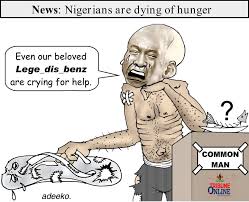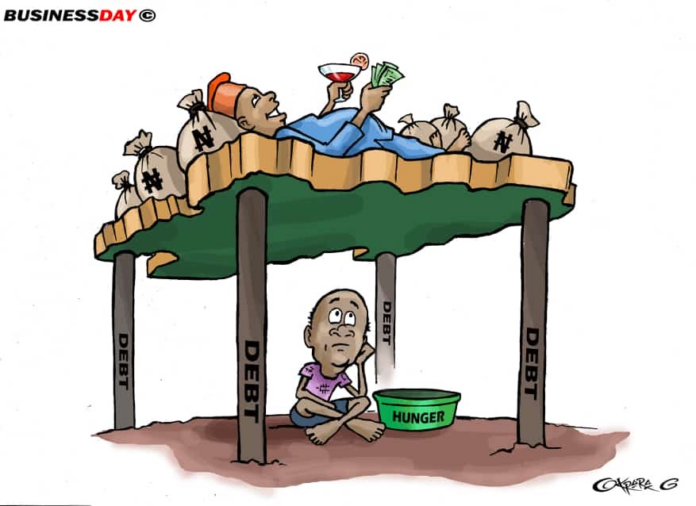By Punch Editorial Board
The Obi of Onitsha, Nnaemeka Achebe, has pointedly employed the milking-the-cow-to-death metaphor to warn political leaders against the monumental corruption eviscerating the country’s monolithic economy and short-changing the people.
“People go into public office not to serve the public, but to serve their interests. Either we keep doing that and milk the cow to death, or we do the opposite and place Nigeria above all else,” Obi said recently.
These words resonate loudly on the streets.
The metaphor addresses the mindless plundering of the country’s oil resources by leaders who should ordinarily create and manage the commonwealth with rectitude.
The World Bank says, “Oil alone accounts for 40 per cent of the country’s GDP, 70 per cent of budget revenue, and 95 per cent of foreign exchange earnings.”
Unfortunately, the leaders have grossly mismanaged the oil-dependent economy and refused to feed it with the nutrients of innovations, accountability, and transparency.

Worse, they have abandoned other resource alternatives, putting the economy in shambles.
After its discovery, oil has been subjected to massive, organised theft. The Federal Government and the sub-nationals allocate humongous funds to oil-powered budgets but with little performance every year.
Former President Muhammadu Buhari said Nigeria lost $150 billion in oil income to looting in the 10 years to 2015.
The state governors collect monthly allocations, waste it, and leave the people in misery. Education is comatose, the health sector is on its knees and the economy is generally in the woods.
Former ICPC Chairman, Bolaji Owasanoye (SAN), said in 2021 that Nigeria lost $10 billion to illicit financial flows.
The country is littered with abandoned and delayed projects. The Chartered Institute of Project Managers of Nigeria estimates that “abandoned projects stand over N17 trillion.”
The Ajaokuta Steel Project, which was conceived 45 years ago to turn around the industrial development of Nigeria and has “gulped $10 billion in 43 years,” has yet to take off.
The Minister of Steel Development, Shuaibu Audu, said reviving the gargantuan project would still gulp from $2 to $5 billion.
Reconstruction works on the Lagos-Ibadan, Sagamu-Ore-Benin, and Ibadan-Oyo-Ogbomoso-Ilorin expressways are taking forever. Many other expressways suffer from a similar fate.
While the Buhari regime borrowed N3.1 trillion to fund the budget deficit in 2022, the Bola Tinubu administration borrowed $2.21 billion to fund N9.18 trillion ($5.46 billion) for the same purpose in 2023.
The management of NNPC, the country’s metaphorical cow, leaves much to be desired.
The first financial report of the NNPC was released in 2020 after over four decades of its operations, with all the refineries posting negative results. This month, VOA quoted NNPC saying that Nigeria loses 200,000 bpd or about $10 billion annually to theft.
Nigeria’s leaders who are supposed to design its road map to greatness are its worst locusts.
Former Head of State, Sani Abacha looted more than $3 billion between 1993 and 1998.
The $12.4 billion Gulf Oil War windfall would later become a subject of litigation and controversy.
While the EFCC said it traced $115 million stashed away to influence the 2015 general elections to a former minister, “at least N47.2 billion and $487.5 million in cash and properties have been traced to the (same) minister by the anti-graft agency.”
The anti-corruption agency seized a 753-duplex estate linked to a yet-to-be-disclosed public officer in Abuja recently.
It has arraigned a former Governor of Kogi State, Yahaya Bello, for alleged N80.2 billion fraud.
Successive governments leave tales of corruption, thus leading a stupendously blessed country into needless borrowing 64 years after independence and 64 years after the discovery of oil in commercial quantities.
In sane climes, leaders build structures and allow institutions to drive governance and check corruption. However, Nigeria’s leaders refuse to build institutions and have elevated corruption to damaging levels.
In 2022, a court in China sentenced a former justice minister, Fu Zhenghua, to life imprisonment for bribery involving over $16 million. Unfortunately, Nigeria plays politics with corruption.
Ex-Plateau State Governor Joshua Dariye was jailed for mismanaging the state’s N1.16 billion funds but was later ignominiously pardoned. His Bayelsa State counterpart, Diepreye Alamieyeseigha, was found guilty in London for laundering multimillion pounds and jailed in Nigeria for embezzling multibillion naira funds of the state but was also later ingloriously pardoned.
When Uzor Kalu was convicted for 12 years for N7.56 billion fraud, the verdict was later overturned on a flimsy technical ground that the trial judge who read the judgement was a vacation judge!
The inglorious chain of corruption with impunity walks on all fours countrywide.
In serious climes, leaders go into public office to serve, and they come out poorer.
US President Bill Clinton left the White House poorer than he assumed office. While US presidents pay for their meals, Nigerian legislators receive mouth-watering sums as monthly earnings.
The senators earn N21 million monthly among other emoluments. When news filtered that ranking senators recently received N500 million (annually) for phantom constituency projects, the senator who exposed the secret was suspended.
The monumental sums received by local councils have always gone down the drain.
Nigeria’s shambolic elections that always end up in the courts contribute to milking the cow to death.
At least 50 elections were nullified by tribunals sitting in different parts of the country in the 2015 elections in November that year.
The Independent Electoral Commission said it ran a budget of N75 billion for the polls.
No doubt, the oil cow is tired and waddling to Golgotha. The government must do something to revive it and inject accountability, transparency, and functionality into its outcomes.
Diversification breeds other types of cows. The government must return to its diversification policy that will radically put its agriculture, mining, creative economy, and other revenue-generating sectors in the ranch of productive cows.
The 2005 National Political Reforms Conference set up by President Olusegun Obasanjo says in its report that every state has at least five minerals in commercial quantity under its soil. All anti-investment laws should thus be amended.
The states should have the power to explore mineral resources.
Other countries are exploring alternative energy sources while applying technology to manage their oil business chain. The federal and state governments must imbibe these initiatives and give Nigeria’s economy a breath of fresh air.
Turning Nigeria’s economy around is a collective effort.
Legislators must prioritise Nigeria by enacting pro-governance and development laws.
The judiciary should introduce radical reforms that will purge it of bad eggs and re-earn its place as the last hope of the common man and the country.
The people should take an active part in politics and governance, and civil society organisations should play a more active role in monitoring the leaders.
There is a need to review Nigeria’s expensive electoral system, which gives electoral victory to the highest bidder. The people and civil society must push for an electoral system that will make the cost of contesting elections inexpensive and people-driven. It is the only way to make competent and good people contest elections and make the people own their democracy.
Prevention is the key to averting corruption. The Due Process Office introduced years back should be revitalised by all three tiers of government for accountability and transparency purposes so that the dying cow can live, its young ones can be well nourished, and the country can attain prosperity and development.





